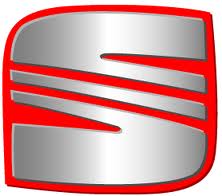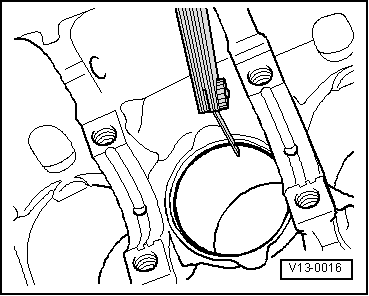Leon Mk1
|

| 1 - | Conrod bolt, 30 Nm + 1/ further 4 turn (90°) |
| q | Replace |
| q | Oil threads and contact surface. |
| q | To measure the radial play, use used bolts |
| q | When measuring radial clearance, tighten to 30 Nm but do not turn further |
| 2 - | Bolt with pressure relief valve, 27 Nm |
| q | Opening pressure 1.3 ... 1.6 bar |
| 3 - | Oil spray jet |
| q | For piston cooling. |
| 4 - | Conrod bearing cap |
| q | Mark cylinder number -B- |
| q | Fitting position: Marking -A- towards the pulley end |
| 5 - | Bearing shells |
| q | Upper bearing shell with a drilled hole for lubricating the piston pin |
| q | Installation position → Fig. |
| q | Do not interchange used bearing shells (mark). |
| q | New axial play: 0,10 ... 0.35 mm. Wear limit: 0.40 mm |
| q | Recheck the radial play using a Plastigage New: 0,02 ... 0.06 mm. Wear limit: 0.09 mm do not rotate the crankshaft during the radial play measurement |
| 6 - | Conrod |
| q | With industrially cracked conrod cap. |
| q | Renew as set only. |
| q | Mark cylinder number -B- |
| q | Fitting position: Marking -A- towards the pulley end |
| q | With a drilled hole for lubricating the piston pin |
| 7 - | Circlip |
| 8 - | Piston pin |
| q | If difficult to move, heat piston to 60 °C |
| q | Removing and installing with the awl -T20019- |
| 9 - | Piston |
| q | check → Fig. |
| q | Mark installation position and cylinder number. |
| q | Arrow on piston crown points to pulley end |
| q | Install using piston ring clamp |
| q | Piston and cylinder dimensions → Chapter |
| q | Checking cylinder bore → Fig. |
| 10 - | Piston rings |
| q | Displace the gaps at 120° from each other |
| q | Use piston ring pliers to remove and install |
| q | The mark „TOP“ must face towards piston crown |
| q | Piston ring ends: check clearance → Fig. |
| q | Checking ring-to-groove clearance → Fig. |
| Piston ring Dimensions in mm | new | Wear limit |
| compression ring | 0,20 ... 0,40 | 0,8 |
| Oil scraping ring | 0,25 ... 0,50 | 0,8 |
|
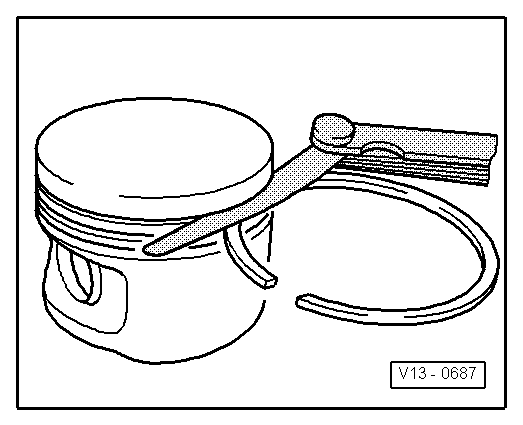
|
| Piston ring Dimensions in mm | new | Wear limit |
| compression ring | 0,06 ... 0,09 | 0,20 |
| Oil scraping ring | 0,03 ... 0,06 | 0,15 |
|
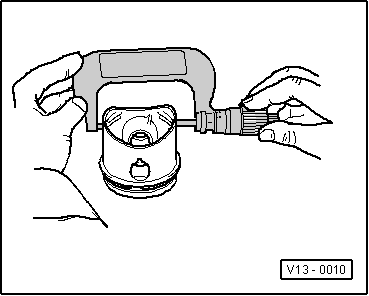
|
 Note
Note
|
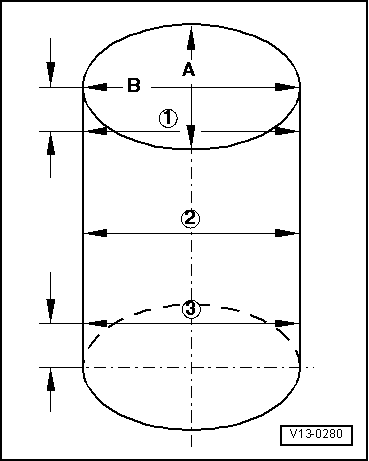
|
|
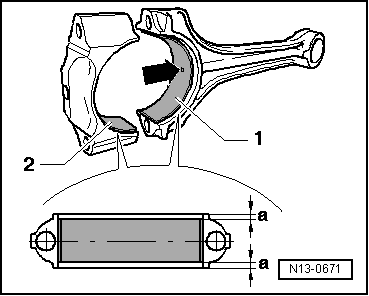
|
